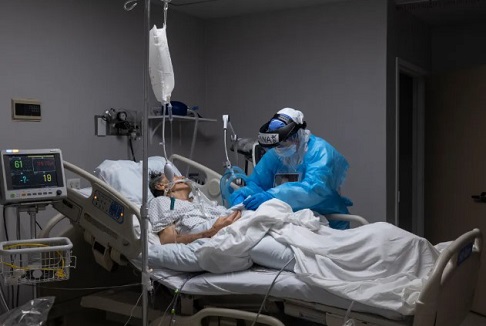Nikhil Prasad Fact checked by:Thailand Medical News Team Nov 21, 2024 5 months, 5 days, 1 hour, 50 minutes ago
Medical News: The pandemic caused by SARS-CoV-2, responsible for COVID-19, has transformed lives globally since its discovery in late 2019. While much progress has been made in understanding the disease, there remain unanswered questions, particularly about the mechanisms driving severe cases. Recent research led by experts from Università degli Studi di Milano, Ospedale Luigi Sacco, IRCCS Ospedale San Raffaele, and other Milan-based institutions sheds light on the role of the C1 esterase inhibitor (C1-INH) in the body’s response to the virus. This
Medical News report explores these findings, revealing potential breakthroughs in treatment strategies.
 Role of C1-Inhibitor in COVID-19 Severity
Role of C1-Inhibitor in COVID-19 Severity
C1-INH is a powerful protein responsible for regulating several vital systems, including those related to inflammation and clotting. It plays a central role in the kinin-kallikrein system (KKS), which controls processes like blood vessel permeability and inflammation. Understanding how C1-INH interacts with COVID-19 could illuminate why some individuals experience severe symptoms while others remain relatively unaffected.
The Key Findings of the Study
The study analyzed 45 hospitalized COVID-19 patients, grouped by disease severity. Researchers measured levels of total and functional C1-INH in their blood, comparing these with a control group of 18 healthy individuals. Here’s what they found:
-Elevated C1-INH Levels Across All Patients
COVID-19 patients consistently showed higher levels of C1-INH than the control group. This increase was most pronounced in patients with mild to severe disease, indicating that C1-INH is a key player in the body's initial immune response. However, critically ill patients exhibited a paradoxical decrease in functional C1-INH levels relative to total levels, pointing to possible protein exhaustion.
-Reduced Functional C1-INH in Mild to Intermediate Cases
While total C1-INH levels rose, its functionality as an inhibitor was compromised in patients with mild or intermediate disease. Functional-to-total C1-INH ratios were lowest in these groups, suggesting that the protein is actively consumed in fighting inflammation and preventing clot formation during the early stages of illness.
-Dysregulation in Critical Patients
Interestingly, the functional-to-total C1-INH ratio returned to normal in critically ill patients, despite remaining elevated in quantity. Researchers hypothesize that this normalization may reflect the exhaustion of processes like the kallikrein-kinin system, leading to diminished immune responses.
-Increased C1-INH and KKS Activation
Patients with mild to moderate disease showed higher levels of complexes formed by C1-INH and kallikrein, a protein involved in the KKS. These findings suggest that the kallikrein-kinin system is heavily activated in the early stages of COVID-19, further consuming C1-INH. However, this activation was significantly lower in c
ritically ill patients.
Implications for Treatment
This study offers new insights into how the immune and clotting systems interact during COVID-19. The consumption of C1-INH during the early stages suggests that therapies targeting this protein could help control disease progression. For instance, administering C1-INH in the early stages of infection might stabilize inflammatory responses and prevent severe outcomes.
Unfortunately, clinical trials using recombinant C1-INH have yielded mixed results. Timing and dosage appear to be critical factors, as delayed intervention may fail to reverse disease progression once critical stages are reached.
Conclusion
The research highlights the pivotal role of C1-INH in managing the immune response to COVID-19. By actively regulating inflammation and clotting pathways during the early stages of infection, C1-INH helps mitigate disease severity. However, its overconsumption or functional exhaustion in severe cases underlines the importance of targeted therapies to optimize its effectiveness.
Future studies must explore how C1-INH levels and functionality influence long-term COVID-19 outcomes, such as persistent symptoms or organ damage. This nuanced understanding could pave the way for innovative treatments not only for acute infections but also for "long COVID."
The study findings were published in the peer-reviewed journal: Life.
https://www.mdpi.com/2075-1729/14/12/1525
For the latest COVID-19 News, keep on logging to Thailand
Medical News.
Read Also:
https://www.thailandmedical.news/news/covid-19-study-links-extracellular-vesicles-to-severe-outcomes
https://www.thailandmedical.news/news/zinc-sulfate-may-block-covid-19-brain-invasion
